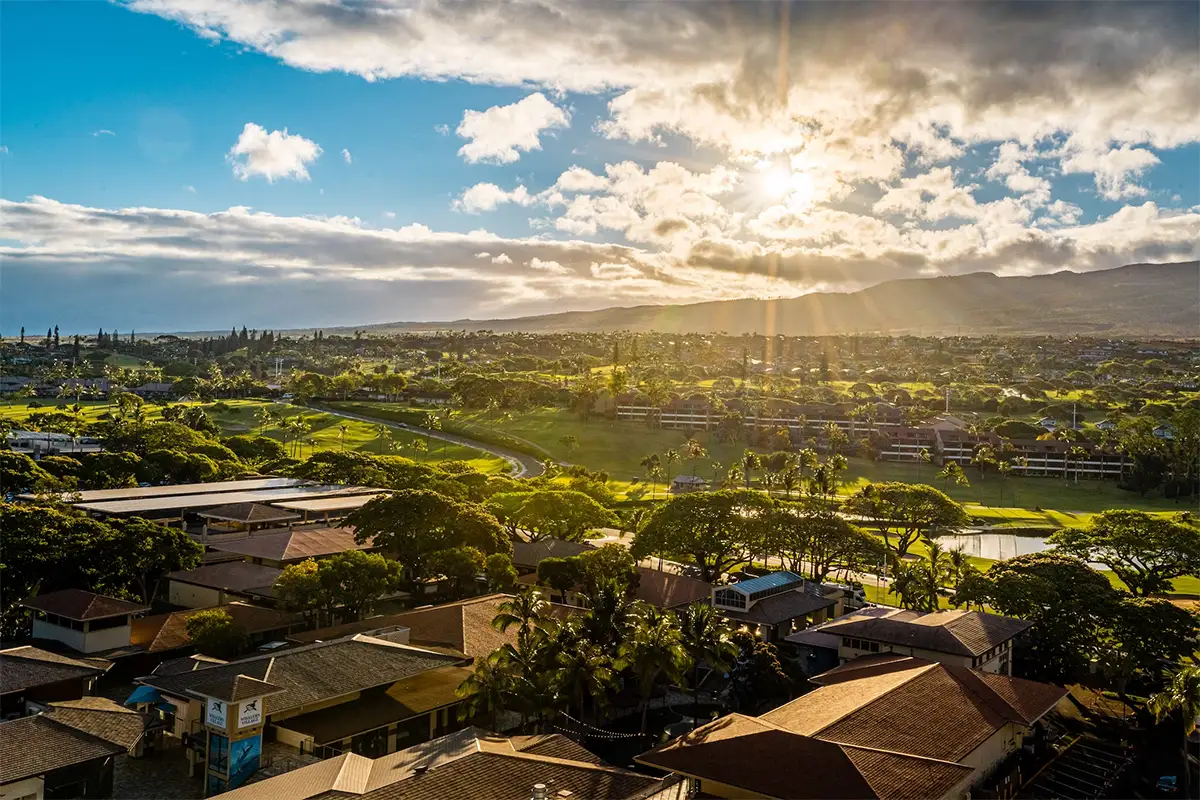 Hawai'i Journalism Initiative
Hawai'i Journalism InitiativeFive years after pandemic, hospital workers on Maui still remember the mental toll
When he was working in the COVID unit of Maui Memorial Medical Center in 2020, intensive care unit nurse Josh Masslon learned to write backwards on the glass panels of patients’ rooms so that staff outside could drop off supplies and minimize exposure to the deadly disease.
He would leave the rooms drenched in sweat from his full-body plastic gown and the helmet of his powered air-purifying respirator.

These were the early days of the COVID-19 pandemic, which arrived in Maui County in the spring of 2020. Five years later, the surge tent outside the emergency room is long gone, along with the vaccine clinics and restrictions on visitors. The hospital now treats COVID like any other respiratory illness. But what is not long gone is the mental toll of the global health crisis that still lingers for medical workers.
HJI Weekly Newsletter
Get more stories like these delivered straight to your inbox. Sign up for the Hawai‘i Journalism Initiative's weekly newsletter:
“We definitely didn’t have the resources in the beginning,” Masslon said. “We adapted, but it was horrible just to watch people suffer alone. That was the worst part.”
As the only acute-care hospital on the island, Maui Memorial was the primary care facility for COVID patients. The workers there shouldered a large portion of the workload, driving many to retire early or leave their departments. The workers who stayed went to great lengths not to bring the virus home and spent months in isolation from loved ones and neighbors who applauded their bravery but feared being around them.
Longtime nurse Leimomi Melamai had a routine after every shift in the Obstetrics Department during the pandemic. She’d call her husband and two kids, then 10 and 7, and give them time to gather their things and go into their rooms. Then she’d go straight to the garage, where the washer and dryer were, wash her work clothes, shower, grab a meal and stay in her room.
For months, she didn’t sleep with her family, couldn’t hug her kids and would take meals passed through the door from her husband.

“I haven’t talked about it since then, but it’s still fresh in my mind,” said Melamai, who grew emotional at the memory of the isolation. “And that’s why it’s just totally brought on this wave of emotions just now.”
The COVID unit, set up in a former ICU wing of Maui Memorial, was an “awful” place to be, said Masslon, who volunteered to work in the unit for two of his three weekly shifts, and sometimes all three.
Many patients were sedated or on life support, isolated in individual rooms. Nurses took their lunch breaks alone. Masslon remembers one patient so starved for human contact that she begged him for a hug, and he obliged, even though “I was terrified.”
To minimize exposure, nurses had to calculate everything they might possibly need before entering a room, whether that was Tylenol or IV tubing. Once they were in the room, they tried to get all treatments done in one fell swoop. If they needed something, they pounded on the glass and wrote their colleagues a message.
Most people at the hospital avoided the unit. Doctors made calls instead of in-person visits. Pharmacists delivered drugs to the hallway outside. Housekeepers couldn’t come in to clean, leaving that duty, too, to the nurses. Masslon said he’s not throwing other workers under the bus — that was just the nature of a crisis in which everyone was trying to minimize exposure.
Masslon said the unit had enough nurses, but not enough support staff. Supplies were limited, and early on, Masslon clashed with hospital administration over the reuse of N95 masks and his desire to wear his own instead of one issued by the hospital. He and his wife, who was also an ICU nurse at the time, spent $300 for a box of 10 precious N95 masks on eBay. He and other nurses also bought powered air-purifying respirators to avoid reusing masks.
Exposure, however, was hard to fully avoid. When Masslon’s wife was exposed to COVID, they rented a condo in Honokowai where she could wait out the isolation period. His daughter was 8 years old at the time and didn’t understand why she couldn’t hug her mom.
“I would drive to the parking lot and she would wave through the window and just cry,” Masslon said.
Masslon said “COVID turned a lot of people jaded, sour, they had to put up walls to protect themselves” from the stress of their jobs and the frustration over not getting to interact with their patients the way they once did. He watched a lot of nurses leave the ICU or retire early.
A couple years into the pandemic, the psychological toll of caring for seriously ill COVID patients pushed Masslon to scale back to working two required shifts instead of three. He picked up a part-time job at a hotel to help make ends meet.
“Best decision I ever made,” Masslon said. “I mean, I still love nursing. But … only being required to put in two days a week has helped me maintain a passion and love for the job.”

PATIENTS WERE THEIR FOCUS
Despite her fears of passing the virus on to her family, Melamai said she was never afraid to take care of COVID-positive patients. It was her job. It was what nurses do. She thought about how she’d want her family to be treated if they came to the hospital. She channeled that into her patients.
In the Obstetrics Department, a place usually full of celebratory moments was more somber during the pandemic. Part of the unit was closed off solely to treat patients with COVID, and moms who came in COVID positive had to be separated from their babies for 24 hours, Melamai said.
Sometimes, staff would give instructions to patients through speakers in the room. Melamai didn’t like the distance, and she stayed in rooms with patients whenever she could, even if they were COVID-positive.
“Just making the patient feel comfortable, I think that was the biggest thing in there, because they’re coming in scared,” Melamai said.
Patients died alone because their loved ones couldn’t be with them.
Melamai remembered one pregnant patient whose COVID symptoms were so bad, she had to go to the ICU. When the patient died, it had been two or three weeks since the father of her child had heard her voice or held her hand. It’s one thing she wishes the hospital had done differently — allowed people to visit their loved ones as long as they were dressed in the full protective gear that workers wore.
Caring for patients during the pandemic “was like learning a whole different type of nursing,” said obstetrics nurse Napua Aloy.
“Now, you’re not just a labor and delivery nurse, but you’re also taking care of a patient who has a contagious infection that could infect not just your staff, but also patients on the floor,” Aloy said.
But Aloy said she never thought about leaving her job.
“It is a job, but it’s still also our kuleana to take care of everyone, so there was no question in my mind to quit,” Aloy said.
Maui Memorial went through waves of infections, with the number of overall COVID patients and those in the ICU rising along with community numbers. The hospital itself also had multiple clusters. Aloy said she felt like hospital leadership was transparent in terms of communicating with staff through town halls, newsletters and emailed updates. She also felt like the hospital made the right calls because infections eventually decreased.
Melamai didn’t agree with all of the hospital administration’s decisions. She said sometimes, if the hospital was shorthanded, they’d tell COVID-positive employees to come back to work even before the end of the 10-day isolation rule that was in place in the early stage of the pandemic.
However, she said, “they definitely did try to do what they thought was right” during the pandemic. She wished the hospital administration had listened more to the nurses and people who were working on the floor, “because it did feel like we were being unheard.”
Despite his early disagreements with leadership over his desire to wear his own mask instead of one supplied by the hospital, Masslon also said that ultimately, “most people were trying to do what they thought was best with the information that they had.”
“There was all those little battles in between, but in hindsight, you have to look back and say well, from their perspective, they did what they thought was right. I did what I thought was right,” Masslon said.
He worked in the COVID unit until the hospital stopped reserving a floor for only COVID patients. Now, he said, they treat it like any other respiratory illness but only isolate the room and have staff wear protective gowns.
The pandemic wasn’t all bad memories. Masslon will always treasure the time he got with his kids, when he’d take them down to Kā‘anapali and cruise down the empty boardwalk on skateboards and scooters. Later they’d stash them in the naupaka bushes while they went swimming along the empty beach.
“It never ceases to amaze me how awesome the people on Maui can be, during COVID, those fires, it’s amazing,” Masslon said. “It’s not perfect — nowhere is — but it’s pretty close to it.”





